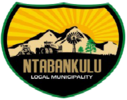Ntabankulu Local Municipality
| Ntabankulu | ||
|---|---|---|
| Local municipality | ||
|
||
 Location in the Eastern Cape |
||
| Coordinates: 32°10′S 28°35′E / 32.167°S 28.583°ECoordinates: 32°10′S 28°35′E / 32.167°S 28.583°E | ||
| Country | South Africa | |
| Province | Eastern Cape | |
| District | Alfred Nzo | |
| Seat | Tabankulu | |
| Wards | 18 | |
| Government | ||
| • Type | Municipal council | |
| • Mayor | Lwana Zuko | |
| Area | ||
| • Total | 1,385 km2 (535 sq mi) | |
| Population (2011) | ||
| • Total | 123,976 | |
| • Density | 90/km2 (230/sq mi) | |
| Racial makeup (2011) | ||
| • Black African | 99.4% | |
| • Coloured | 0.4% | |
| • Indian/Asian | 0.1% | |
| • White | 0.1% | |
| First languages (2011) | ||
| • Xhosa | 95.2% | |
| • English | 1.4% | |
| • Other | 3.4% | |
| Time zone | SAST (UTC+2) | |
| Municipal code | EC444 | |
Ntabankulu Local Municipality is an administrative area in the Alfred Nzo District of Eastern Cape in South Africa.
Ntabankulu is an isiXhosa name meaning "great or big mountain", since the municipal area is mountainous in character.
It was formerly part of the OR Tambo District Municipality, but was transferred to the Alfred Nzo District Municipality after the 2011 municipal election.
The 2001 census divided the municipality into the following main places:
The municipal council consists of thirty-four members elected by mixed-member proportional representation. Seventeen councillors are elected by first-past-the-post voting in seventeen wards, while the remaining seventeen are chosen from party lists so that the total number of party representatives is proportional to the number of votes received. In the election of 3 August 2016 the African National Congress (ANC) won a majority of twenty-nine seats on the council. The following table shows the results of the election.
...
Wikipedia

